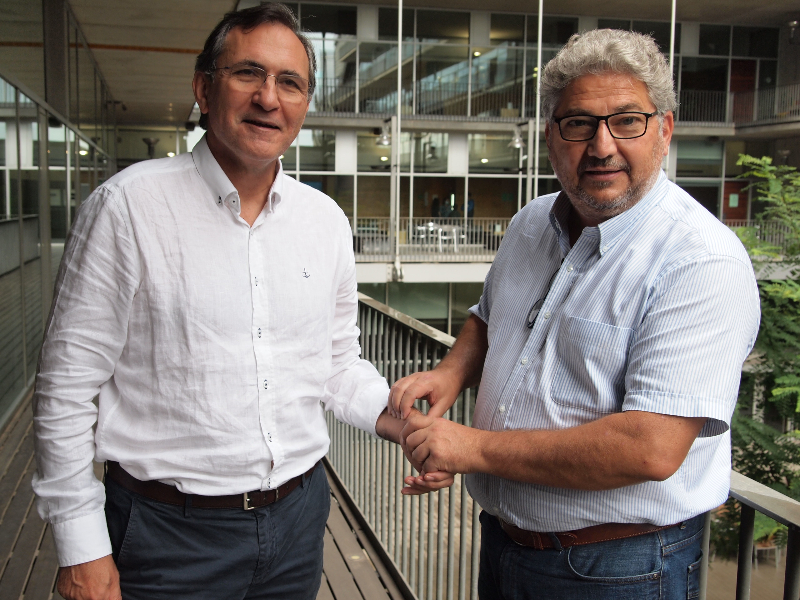
26/10/2021 - Press release
The risk of death from any cause increases by 30% for each 10 beat per minute increase above 70 beats per minute. The study, led by researchers at the Hospital del Mar Medical Research Institute, analysed data from more than 10,000 participants in the REGICOR study to establish the relationship between heart rate and the risk of cardiovascular disease and death. It is a simple measurement indicator, which also provides information on the risk of cardiovascular disease. The work has been published in the European Journal of Preventive Cardiology
Having a heart rate over 70 beats per minute is associated with an increased risk of developing cardiovascular disease and death, according to the results of a study led by researchers from the Cardiovascular Epidemiology and Genetics Research Group at the Hospital del Mar Medical Research Institute (IMIM-Hospital del Mar), published in the European Journal of Preventive Cardiology. The study analysed data from more than 10,000 people, making it possible to identify increased heart rate as a way of obtaining information on the risk of developing this type of pathology.
The researchers analysed data from 10,466 participants from the REGICOR study (Registro Gironí del Cor). An electrocardiogram was used to measure their heart rate after five minutes of rest and they were monitored regularly for over 10 years to assess their health status. Of these, 1,398 died during the study period and almost 1,000 (962) had a cardiovascular health problem. The study used information from the Generalitat de Catalunya's PADRIS programme on data analytics for research and innovation in health.
Greater risk from 70 beats/minute onwards
This monitoring has established that there is a relationship between a higher number of heartbeats and an increased risk of developing cardiovascular diseases and mortality. Specifically, the study established 70 beats per minute as the threshold above which this possibility increases. Above this figure, the risk goes up by 30% for every increase of 10 beats per minute.
"The relationship between a higher heart rate and greater mortality risk has already been observed in other groups. But this is the first study of our population. Moreover, we observed that the relationship appears at heart rates above 70 beats per minute", explains Dr Roberto Elosua, principal investigator of the study and IMIM researcher. The work of the researchers has made it possible to precisely determine this figure and relate it to an increased risk of death within 10 years, "In other words, on average, people who have a resting heart rate of 80 beats per minute have a 30% higher risk of dying in the next 10 years compared to people who have a heart rate of 70 beats per minute", adds Dr. Albert Clará, head of the Angiology and Vascular Surgery Service at the Hospital del Mar and an author of the study.
The results reveal that a simple indicator such as heart rate can provide useful information on the risk of developing cardiovascular disease or death in the next 10 years. In this sense, Dr Roberto Elosua points to "avoiding the consumption of stimulant substances and promoting physical activity or meditation as activities that can help us to reduce our heart rate." Heart rate control responds to the needs of our body at all times and is regulated by a part of the nervous system called the autonomic nervous system, with sympathetic activity, which activates and increases the heart rate, and vagal activity, which reduces it.
Researchers from the CIBER on Cardiovascular Diseases (CIBERCV), the University of Vic-Central University of Catalunya, the Autonomous University of Barcelona, the IDIAP Jordi Gol, the IDIBGI, and Hospital Germans Trias i Pujol also took part in the study.
Reference article
Puig E, Clará A, Pérez S, Degano IR, Subirana I, García-García C, Martí R, Ramos R, Marrugat J, Elosua R. Resting heart rate, cardiovascular events, all-cause mortality: the REGICOR study. European Journal of Preventive Cardiology 2021. doi: 10.1093/eurjpc/zwab148

Dr. Roberto Elosua (left) i Dr. Albert Clarà (right)
Servei de Comunicació:
Marta Calsina(ELIMINAR)
Tel:
(+34) 93 316 06 80
Doctor Aiguader, 88
08226 Barcelona
© Institut Hospital del Mar
d'Investigacions MèdiquesLegal Notice and Privacy Policy | Cookie Policy | Site Index | Accessibility | Find Us | Contact